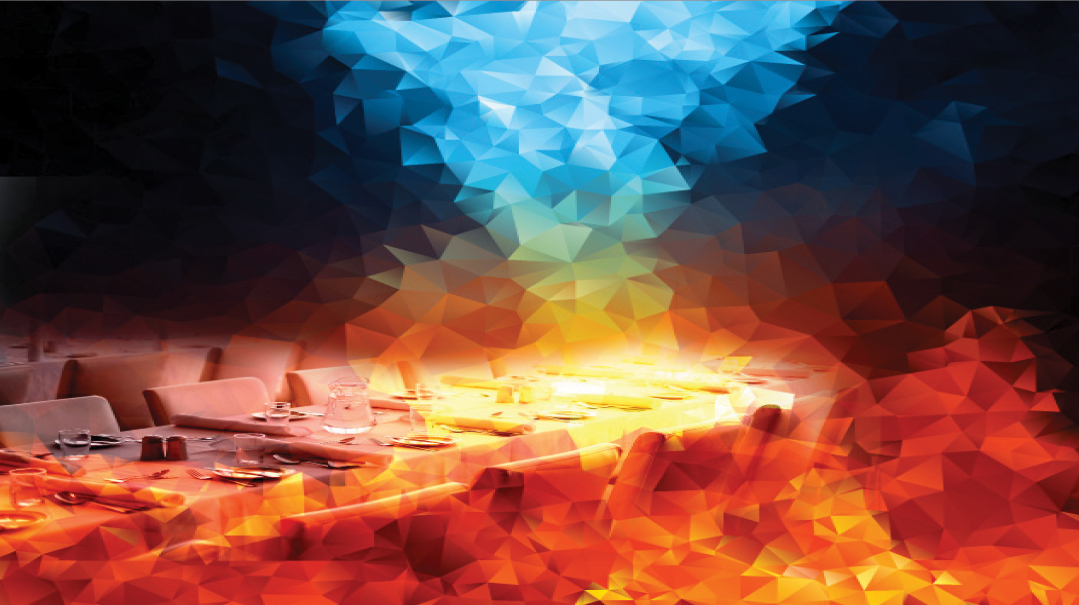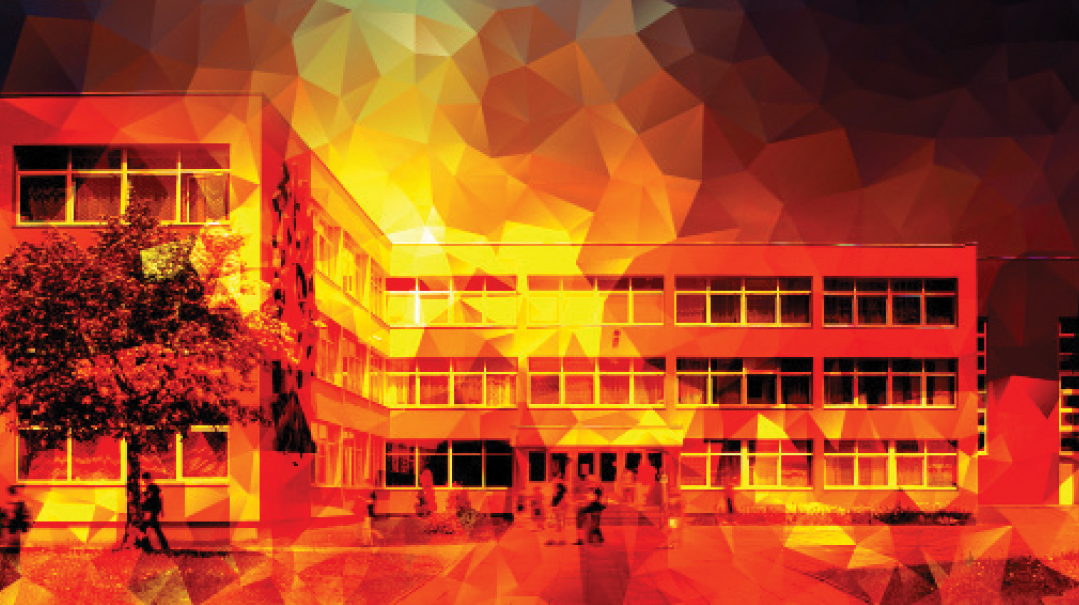The Heat Is On

A small flicker, a smoldering ember. If left unchecked, it can become a raging inferno, consuming everything in its path. Unless someone stands tall and douses the flames. Four tales of courage

As told to Devorah Grant
Teenagers. Some love them to pieces — the feistier, the better — while others keep their distance and shudder at the mere mention of the turbulent life stage.
I’m definitely in the former camp, and although my day job is of the answering-phones variety, my real energies are reserved for the Bnos groups and shabbatons I regularly run. Which is how I met Shevi.
Shevi was involved with the rav and rebbetzin who had reached out to me a couple years ago. Up-and-coming experts on teens, this dynamic couple had a gaggle of high school girls at their Shabbos table each week. Many of them were holding onto Yiddishkeit by a delicate thread, which threatened to snap at any moment, and inspiration was needed fast.
“Nothing can do what Shabbos does,” explained the rebbetzin, when she asked if I’d accompany the group on a shabbaton they were arranging.
“Count me in,” I said, a purposeful energy tingling in my bones. This was going to be fun.
Except that it wasn’t.
I’d thought I’d met all kinds of teenagers before. I was used to their extreme way of relating to adults, to the world around them. I’d always assumed with enough patience and warmth you’d get through to them. But these girls… wow. A different species.
To be honest, most of the girls were lovely and sweet, lost and misguided, and needing the gentle touch they’d never experienced. It was a shame the shabbaton had to be ruined by Shevi and her friends.
It started immediately. Shevi looked sour when the rebbetzin bentshed licht. I took a few steps toward her. Big mistake. Shevi, with her over-painted lips, stared me up and down, and then again. Her eyes are stunning, I thought, noticing their startling greenness. Also scary. I stepped back.
It was a tiny moment, but it defined the remainder of the shabbaton. Angry, antagonistic Shevi made retreating feel like the safest option.
When the group gathered in a cozy circle to daven Kabbalas Shabbos, Shevi forcibly pulled her chair out, followed quickly by her sidekicks, Rikki and Ellie. They sat in the corner making an impossible racket, hollers of laughter and unrefined language filling the air, while we strained to sing Lecha Dodi. I looked at the rebbetzin, she looked at me. Leave them, her eyes told me. Okay, I telepathized back, feeling helpless.
The seudah went smoothly. The girls were obsessed with the rebbetzin and her family, and baby Gila was doing a great job of gurgling and smiling as she was passed around.
I tried to like Shevi, but it was hard. She spoke through Kiddush, refused to wash, and glared down anyone who dared to look in her direction. Shevi spoke and spoke, with a sneer that seemed perpetually frozen on her face. I watched as the girls around her had no choice but to listen. Zemiros, the rav’s speech, the rebbetzin’s quiz — they were all ruined by Shevi.
“It’s a complicated case,” the rebbetzin told me after the seudah had finished. Out of the corner of my eye, I saw Shevi and her cronies walk out the room holding the bowls of nosh we’d put out for everyone. I noticed the wounded expressions of those left behind.
“She’s been hurt terribly. Time and time again. She struggles to trust. I’ll try talk to her.” But when called for, Shevi refused to come.
The night was long and noisy, as expected, and the sun came up too early the next day. I blearily eyed myself in the mirror of my tiny quarters and smiled. A new day, a new chance.
But it was even worse than the night before. Shevi flounced down the stairs, tossing her honey-colored curls, her friends at her tail. I smiled in greeting. They ignored me. The meal, the afternoon, continued in the same vein. Every time the girls had a chance to warm up, to be positive, an icy, cutting remark would fill the air. Each time we tried to foster an atmosphere of unity, Shevi would break away, drawing others with her.
Outside, the sun dipped, pink clouds covered the horizon. I stared out the window and cried. For the Shevis of this world, for their frozen souls, for the pain and heartache stuck deep within them, never revealed. Then I took a deep breath, turned around, and joined The Debate.
The Debate is what I call the dialogue kiruv experts often stimulate by throwing out thorny questions to the audience, getting them to discuss and dissect age-old arguments. Usually, it stimulates thought and provokes strong emotions and it can be a fascinating discovery for participants. But with Shevi there, I doubted we’d get through anything.
The rav offered his first controversial statement. A dilemma about a train speeding along a track, killing three people along the way, unless you divert it and kill one. Morals and ethics and objectivity, all in one loaded question. The room buzzed. The girls excitedly debated, while I walked around, listening to what they said, asking questions, smiling at impassioned faces.
Suddenly, a scraping of chairs. I turned, startled. Shevi and Rikki. Arms crossed, eyes flashing at each other, shouting. They were debating. Or, more accurately, attacking each other. Loudly. The room fell silent as they flung sharp words, at increasing volumes. It was like a game of ping-pong, a terribly uncomfortable game. I looked frantically at the rebbetzin, who caught my eye and nodded, slightly, her gaze directing us both back to the sparring girls, a hint of wonder in her eyes.
Why isn’t she doing anything? I thought. I noticed the rav and rebbetzin exchange a glance. Another nod. They were going to leave the girls to it.
I questioned their judgment. They were young and inexperienced, and looking at all the other girls around, shifting uncomfortably in their seats, I wasn’t sure they were right. Then, suddenly, as quick as it began, I heard Shevi say, “Yeah. Maybe. I never thought like that. And OMG, can everyone stop staring?”
The old Shevi was back. The room relaxed. Murmurs filled the air. Rikki plopped onto a chair, cheeks flushed, eyes bright. And Shevi smiled. Smiled! Shocked and stupefied, I looked back at the rav and rebbetzin, who were also smiling.
The short remainder of the Shabbaton was different. The same girls, the same topics and discussions, but something had shifted. The apathy was gone, there was a spark of interest. And even though Shevi was still Shevi, I caught a longing in her eyes, undisguised, as her defenses relaxed.
A memorable girl, a memorable Shabbos. Where a flame could have been extinguished, but instead, was kindled. For sometimes we only need tolerate the heat to ignite the burning desire that lies dormant inside.
(Originally featured in Family First, Issue 691)
Oops! We could not locate your form.










